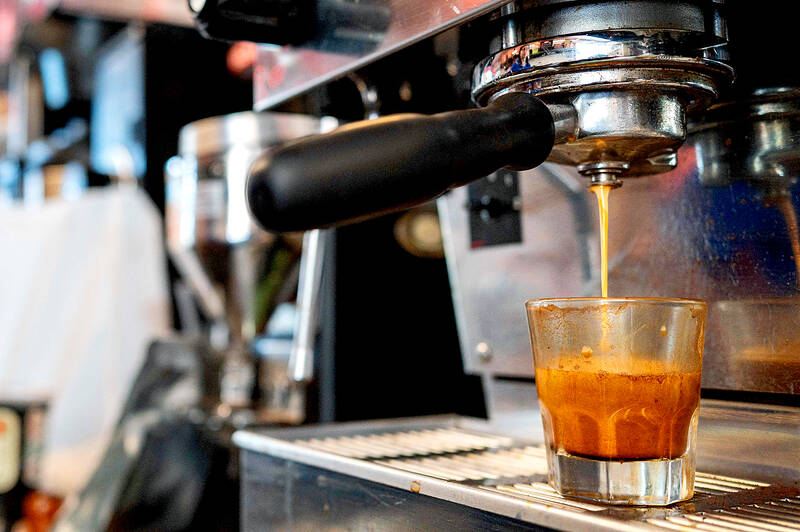Swaying to dance music and TikTok-fueled pop under a disco ball, young punters are packed shoulder to shoulder while sipping on coffee, their energy powered by pour-overs rather than pints.
This is no underground rave, nor a brunch gone wild. It is a caffeine-powered daytime clubbing sesh — part of a growing wave of alcohol-free, Gen Z-driven events gaining traction in Singapore and elsewhere in the world.
At a recent event in Singapore’s trendy Duxton district, the space was jammed by 4pm, with baristas churning out fancy coffees and DJs spinning back-to-back sets. The crowd grooved with energy, even without the usual liquid courage.

Photo: Getty Images via AFP
“A lot of people think alcohol gives you the high, but caffeine sometimes can do that too,” said Aden Low, 21, cofounder of Beans and Beats, which organizes coffee raves at different venues.
“That’s why the atmosphere at our events tends to be quite energetic,” Low said.
The parties blend curated music with specialty coffee served in white paper cups. The vibe is light, friendly and very Gen Z.
“It’s also the idea that this is a safe space,” said Esther Low, 31, who was at the event in Duxton. “When you go to a club setting, there’s usually this underlying intention to hook up. So, for me, that’s personally why I would prefer this.”
Several reports say Gen Z is chugging fewer pints than previous generations, with the sober curious movement gaining popularity on social media. Sober curious people cut back on drinking or abstain altogether, often citing health reasons and better mental acuity.
“Changes in alcohol use have been observed in population surveys and cohort studies. Generally, alcohol use among young adults has decreased,” the WHO said in a report last year.
From London to Los Angeles and Melbourne, similar coffee raves have swept up the social scene, appealing to young partygoers who also want to avoid hangovers.
Ashley Chean, a Singaporean student who has been alcohol-free for a year, said she appreciates these sober gatherings.
“When I lived in Paris, I realized I had a lot of alcoholic tendencies, and I didn’t want that to be my lifestyle,” the 20-year-old said. “More and more of my friends are sober or sober curious.”
The coffee clubbing events are usually held in cafes and other spaces such as rooftop bars — as long as there is room for DJs and baristas to do their thing while people dance.
The parties typically end by late afternoon, just in time for golden hour selfies.
Besides the health benefits of avoiding alcohol, the events appeal to cost-conscious youth in Singapore, one of the most expensive cities in the world.
The excess drinking and hard-partying ways of Gen X — fueled by anthems like the Beastie Boys’ Fight for Your Right (to Party) and hip-hop videos glamorizing club culture — are fading for members of Gen Z.
While organizers do not see Singapore’s glitzy nightlife and clubbing being replaced, they hope their combination of beats and brews would keep the dance floor buzzing.
“As long as we bring the vibes, we’ll be OK,” Ashley said.

THE TRAGEDY OF PUNCH: Footage of the seven-month-old Japanese macaque has gone viral online after he was rejected by his mother and formed a bond with a soft toy A baby monkey in Japan has captured hearts around the world after videos of him being bullied by other monkeys and rejected by his mother went viral last week. Punch, a Japanese macaque, was born in July last year at Ichikawa City Zoo. He has drawn international attention after zookeepers gave him a stuffed orangutan toy after he was abandoned by his mother. Without maternal guidance to help him integrate, Punch has turned to the toy for comfort. He has been filmed multiple times being dragged and chased by older Japanese macaques inside the enclosure. Early clips showed him wandering alone with

South Korea would soon no longer be one of the few countries where Google Maps does not work properly, after its security-conscious government reversed a two-decade stance to approve the export of high-precision map data to overseas servers. The approval was made “on the condition that strict security requirements are met,” the South Korean Ministry of Land, Infrastructure and Transport said. Those conditions include blurring military and other sensitive security-related facilities, as well as restricting longitude and latitude coordinates for South Korean territory on products such as Google Maps and Google Earth, it said. The decision is expected to hurt Naver and Kakao

Australian Prime Minister Anthony Albanese yesterday said he did not take his security for granted, after he was evacuated from his residence for several hours following a bomb threat sent to a Chinese dance group. Albanese was evacuated from his Canberra residence late on Tuesday following the threat, and returned a few hours later after nothing suspicious was found. The bomb scare was among several e-mails threatening Albanese sent to a representative of Shen Yun, a classical Chinese dance troupe banned in China that is due to perform in Australia this month, a spokesperson for the group said in a statement. The e-mail

TENSIONS: The march went ahead without clashes, but arrests were still possible as police investigate suspects behind Nazi salutes, racist slurs and homophobic insults Thousands of people on Saturday marched in southeastern France under heavy security in tribute to a far-right activist whose killing, blamed on the hard left, has put the country on edge. The crowd — many wearing black and some covering their lower faces with masks — marched through the city of Lyon carrying flowers and placards bearing pictures of Quentin Deranque and the words: “justice for Quentin” and “the extreme left kills.” The 23-year-old died from head injuries following clashes between radical left and far-right supporters on the sidelines of a demonstration against a politician from the left-wing France Unbowed